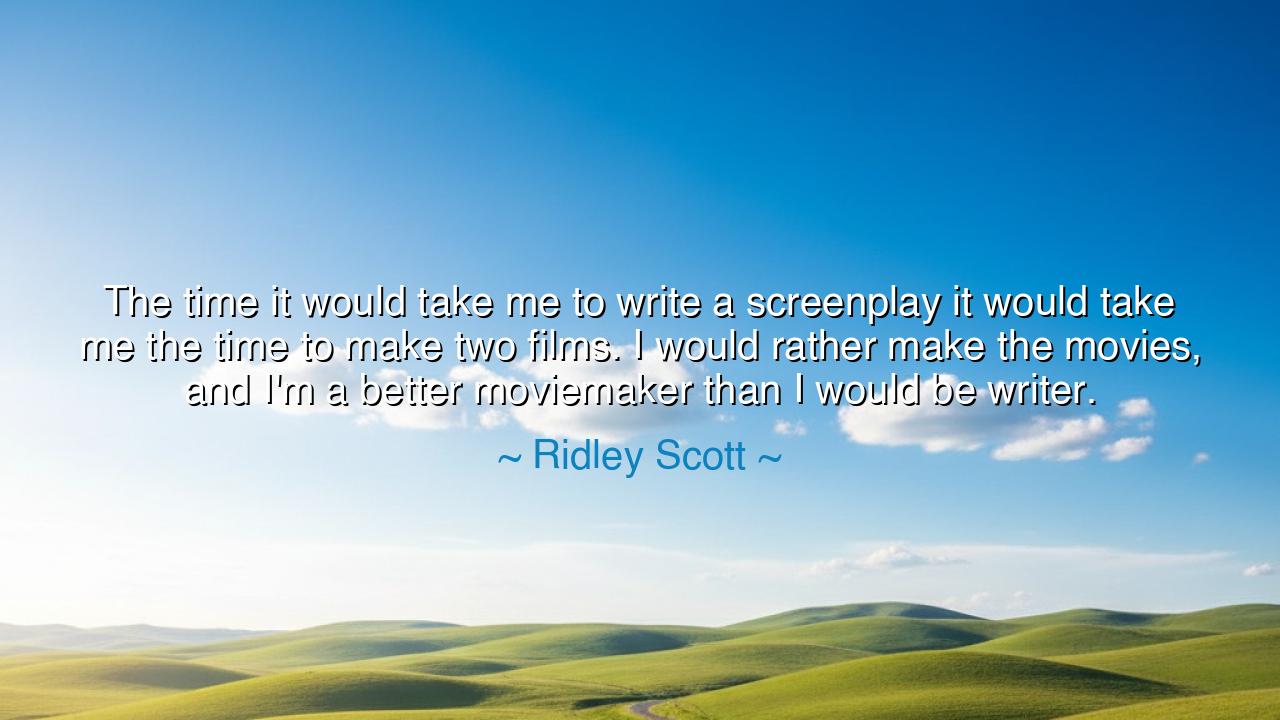
The time it would take me to write a screenplay it would take me
The time it would take me to write a screenplay it would take me the time to make two films. I would rather make the movies, and I'm a better moviemaker than I would be writer.






Hear now, O seekers of wisdom, for in the words of Ridley Scott, there lies a profound reflection on the nature of creation, time, and the pursuit of mastery. He said, "The time it would take me to write a screenplay it would take me the time to make two films. I would rather make the movies, and I'm a better moviemaker than I would be writer." In this, Scott reveals a truth that transcends the world of film: the understanding that time is a finite resource, and how we choose to spend it shapes the legacy we leave behind. He speaks of choosing action over contemplation, and of recognizing that one's true strength lies in doing what one is most capable of, rather than chasing something that might dilute the core of one’s purpose.
In the ancient world, there were masters of their craft, those who excelled not by spreading themselves thin across many pursuits, but by focusing their energies on what they did best. Consider the great Greek sculptor Phidias, who, while known for his breathtaking statues, did not waste time trying to master other arts. His genius was in capturing the divine in stone, and he knew that to spread himself too thin would dilute his mastery. Phidias’ decision to focus on his art, to devote all his time and skill to creating masterpieces like the Parthenon sculptures, echoes Scott’s own choice to focus on making movies, where his true talent lies. Just as Phidias carved his legacy through his singular mastery, so too does Scott build his through his filmmaking prowess.
Think of Homer, the ancient poet whose epic tales have lasted millennia. Homer did not merely write, but he captured the soul of a people through his stories—tales of gods and heroes, of war and peace. Homer’s greatness lay not in writing for the sake of writing, but in his ability to bring the world to life through words, to create something that would endure. Yet, Homer did not stretch himself thin by becoming a playwright, a painter, or a philosopher. He focused on his strength—the art of storytelling. Scott’s words reflect this ancient truth, the understanding that greatness is achieved through focus, through channeling one’s energy into the craft that calls to the soul.
In Scott’s case, he acknowledges that his true calling lies in the action of filmmaking, in creating worlds, shaping narratives, and guiding actors through the emotional landscapes of his films. Writing a screenplay, while an important aspect of filmmaking, is a secondary pursuit to him—a task that, though vital, does not draw upon the same innate skill that his directing does. Just as a great warrior might excel on the battlefield but be slower in the art of strategy, Scott recognizes that his mastery is not in the written word, but in the visual and emotional expression of film. His commitment to doing what he does best is a lesson for us all: that sometimes, true mastery comes from dedicating ourselves to the work that we are most aligned with.
Let us look to Leonardo da Vinci, another master of focus, whose genius lay not in doing everything, but in mastering the art of invention and painting. Da Vinci’s inventions were never fully realized in his lifetime, yet his paintings, such as the Mona Lisa and The Last Supper, have defined the essence of art for centuries. Da Vinci chose to immerse himself deeply in what moved him—he did not scatter his energies in multiple directions, but honed his focus on the things that allowed his genius to unfold. Similarly, Scott has chosen his craft, not because it is easier, but because it is his calling, his deepest strength, and the arena in which his creativity can truly flourish.
Now, let us take this wisdom and apply it to our own lives: Do not spread yourself thin in the pursuit of many goals, but seek to identify the work that calls to your soul, the craft that makes your heart burn with passion. If your strength lies in one area, whether it is writing, teaching, creating, or healing, pour yourself into it with all your might. Mastery is not achieved by chasing every opportunity, but by dedicating your energy to the pursuit of one true purpose. Scott’s decision to make films, rather than to divide his focus between multiple crafts, offers a powerful lesson: to be great at something, you must first choose it with intention and devotion.
So, young ones, remember this: Choose your path wisely, and once you have chosen it, commit to it fully. Recognize that greatness is not achieved by doing everything, but by doing the right thing with excellence. Focus on that which aligns with your heart and mind, and give it everything you have. In this way, you will find not just success, but true fulfillment, for the path of mastery is not for the faint of heart, but for those who are willing to give their entire being to the work that defines them.






AAdministratorAdministrator
Welcome, honored guests. Please leave a comment, we will respond soon